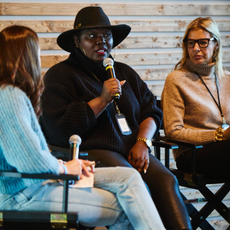

Not that this is something that should preoccupy your thoughts, but…someone probably finds your voice annoying—especially if you're a young woman. For a while now, New York Times features and old-fogey NPR hosts and movies (hey, In a World) have been obsessed with telling us how dumb we sound because we flutter our vocal chords or end sentences like questions or use "like" way too often. But how about this: Is it so wrong if (nearly) everyone I work/live/interact with does it too?
Originally, everyone who writes for this website was supposed to join me in having his/her speech problems picked apart diagnosed by a professional. It would have been a medium-/medium-low-fun bonding exercise, but they all chickened out, which is how I ended up making unnatural, Fran Drescher-like noises in a 100 percent not-soundproof room located less than five feet away from my boss's boss's boss's desk. By myself.
It's cool, though, because after a session with John West, head instructor and co-owner of New York Speech Coaching, I now know I don't sound completely stupid, have a "very pleasant tone quality," and am in possession of a fun, laid-back, affable energy. Ha! No diplomatically worded compliments for you, suckers.
Because you haven't left me in the lurch like those other people, I'm letting you in on my voice issues plus some of the most common problems West sees in his clients.
Too legit to commit
According to West, I talk with a fair amount of vocal fry—that low, creaky, vibrating, very pop-culturally relevant noise your vocal chords make when they flutter. (Yay! I'm a trendsetter!) It's most common at the end of sentences because we run out of air, so to show what a difference paying a little extra attention to your exhale can do, he had me say "Now is the time for all good men to come to the aid of their country," then count to five right after "country." The vocal fry began when I got to "four," but West assured me that phrase is much longer than any we'd say IRL—the point is, see the end coming, and send more air as if you'd have to count to three or four afterward. Or, think about blowing out candles as you reach the final words of the sentence.
Set an intention
This ain't yoga class, but if you, like me, deal with random pauses or "ums" and "uhs," you might also want to be more deliberate in your speech. It's that easy: Have the words in your mind before you say them. And if you need to buy yourself time to think, wait during those moments of punctuation. (You know, where a period or a question mark would be if you were writing out your words.) For practice, read out loud—linking the words until you get to a period or comma and taking a big breath before you start again.
This is how you stop uptalking?
Uptalking is when you make every sentence sound like a question. So how do you combat this? Simple. Try saying five sentences in a row with downspeak—AKA making sure the pitch goes down—to familiarize yourself with how it feels. "I crossed the street today." "I took my dog with me." "I went to the grocery after that." For every day situations, be very conscious the first sentence or "thesis" of your answer always goes down—that's the most common time people use upspeak, which undermines the strength of your argument.
Stay In The Know
Marie Claire email subscribers get intel on fashion and beauty trends, hot-off-the-press celebrity news, and more. Sign up here.
Just girly thingz
So many women pronounce words that end in a "Z" sound with an "S" sound, says West. Making a "Z" sound draws out the words, giving you more authority and gravitas. Same goes for words that end in "D," like "and."
Open wide
"Shrill" and "piercing" aren't exactly adjectives you'd want associated with your...anything, so change how your mouth moves. Look in a mirror or film yourself with your phone, and say the vowels like you're at the dentist—you want to see space between the back of the tongue and the uvula. If you don't see a gap, you're holding your tongue too high when you talk, which pushes air into the head, giving your voice a nasal quality. Similarly, most people hold tension in their jaws/keep their teeth together, which also affects voice quality because the air can't get through. Think of a string pulling your mouth open or taking a bite out of an apple.
Chelsea says relax
You don't have to be an expert like West to be able to hear when someone's nervous or anxious. So chill—mentally and physically. That's how I got to have such a great voice (minus the vocal fry and the awkward silences when I don't say anything because I'm too busy thinking about what I'm going to eat next).
You should also check out:
12 Ways to Sound Smarter and Stronger At Work
13 Words That Undermine Your Authority And Your Intelligence
Dakota Johnson Makes Un-Sexy Things Sound Very Sexy on 'Jimmy Fallon'

Chelsea Peng is a writer and editor who was formerly the assistant editor at MarieClaire.com. She's also worked for The Strategist and Refinery29, and is a graduate of Northwestern University. On her tombstone, she would like a GIF of herself that's better than the one that already exists on the Internet and a free fro-yo machine. Besides frozen dairy products, she's into pirates, carbs, Balzac, and snacking so hard she has to go lie down.
-
 Rihanna Drops a Not-So-Subtle Hint at Her 2024 Met Gala Fashion Plans
Rihanna Drops a Not-So-Subtle Hint at Her 2024 Met Gala Fashion Plans"I'm actually keeping it really simple this year."
By Danielle Campoamor Published
-
 Here's Why Kate Middleton Broke Tradition and Released Prince Louis' Birthday Photo Late
Here's Why Kate Middleton Broke Tradition and Released Prince Louis' Birthday Photo LateIn the past, the Princess of Wales has shared her children's birthday photos right away.
By Danielle Campoamor Published
-
 Kristen Bell Says Husband Dax Shepard Recorded Her "On Laughing Gas"
Kristen Bell Says Husband Dax Shepard Recorded Her "On Laughing Gas""I'd expect nothing less."
By Danielle Campoamor Published
-
 Peloton’s Selena Samuela on Turning Tragedy Into Strength
Peloton’s Selena Samuela on Turning Tragedy Into StrengthBefore becoming a powerhouse cycling instructor, Selena Samuela was an immigrant trying to adjust to new environments and new versions of herself.
By Emily Tisch Sussman Published
-
 This Mutual Fund Firm Is Helping to Create a More Sustainable Future
This Mutual Fund Firm Is Helping to Create a More Sustainable FutureAmy Domini and her firm, Domini Impact Investments LLC, are inspiring a greater and greener world—one investor at a time.
By Sponsored Published
-
 Power Players Build on Success
Power Players Build on Success"The New Normal" left some brands stronger than ever. We asked then what lies ahead.
By Maria Ricapito Published
-
 Don't Stress! You Can Get in Good Shape Money-wise
Don't Stress! You Can Get in Good Shape Money-wiseYes, maybe you eat paleo and have mastered crow pose, but do you practice financial wellness?
By Sallie Krawcheck Published
-
 The Book Club Revolution
The Book Club RevolutionLots of women are voracious readers. Other women are capitalizing on that.
By Lily Herman Published
-
 The Future of Women and Work
The Future of Women and WorkThe pandemic has completely upended how we do our jobs. This is Marie Claire's guide to navigating your career in a COVID-19 world.
By Megan DiTrolio Published
-
 Black-Owned Coworking Spaces Are Providing a Safe Haven for POC
Black-Owned Coworking Spaces Are Providing a Safe Haven for POCFor people of color, many of whom prefer to WFH, inclusive coworking spaces don't just offer a place to work—they cultivate community.
By Megan DiTrolio Published
-
 Where Did All My Work Friends Go?
Where Did All My Work Friends Go?The pandemic has forced our work friendships to evolve. Will they ever be the same?
By Rachel Epstein Published